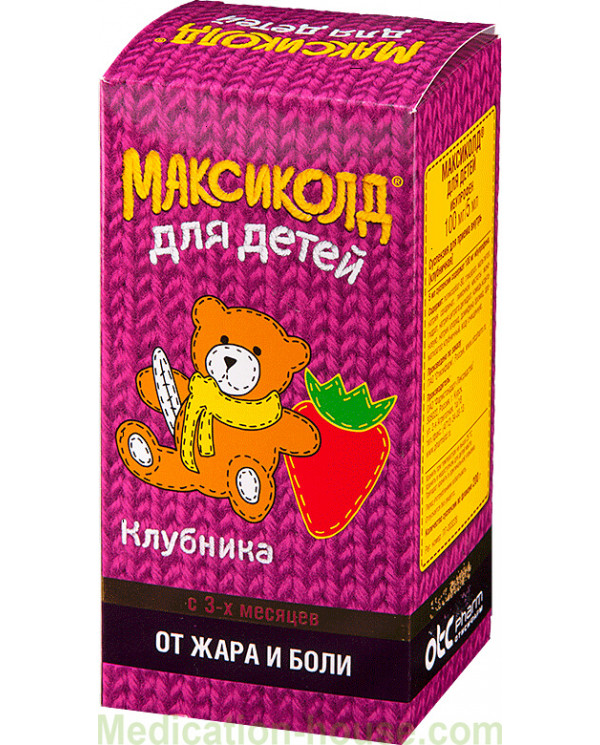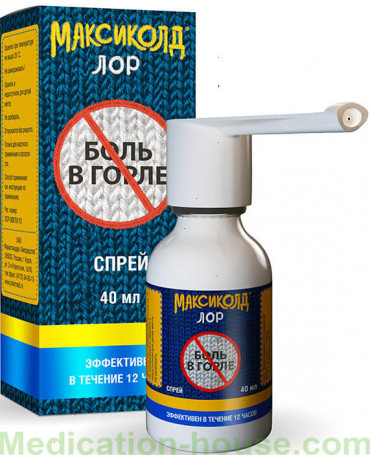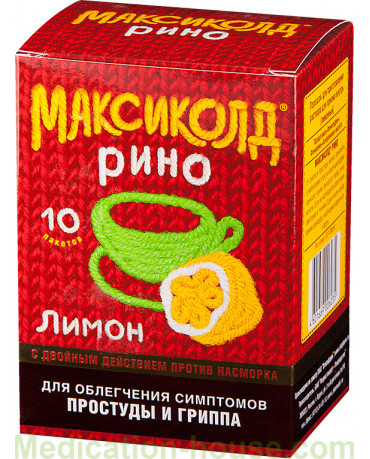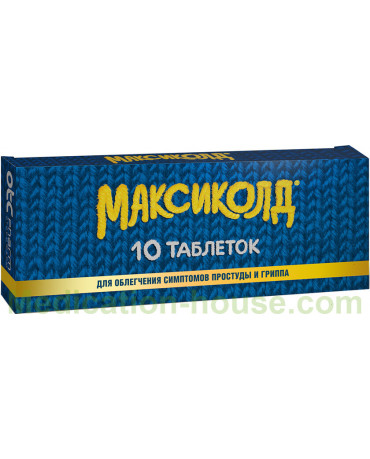Maxicold children instruction
You can buy Maxicold children here
Release form, composition and packaging
The product is a moderate-density suspension with a fruit flavor for oral administration with the active ingredient ibuprofen. As a complement to the composition of the substances - tribasic carboxylic acid in the form of monohydrate, maltitol, xanthan gum, sodium chloride, polysorbate, sodium bicarbonate citrate, glycerol, a bactericidal detergent - domifen bromide, clarified water, flavoring fruit additives (orange / strawberry). The drug is sold in glass bottles in dosages of 100, 150, 200 g, the kit includes a measuring cap, a dispenser with a volume of 10 ml, as well as instructions for use.
pharmachologic effect
The working compound ibuprofen is a derivative of methyl acetic acid, which is part of the group of non-hormonal anti-inflammatory drugs. Its activity is associated with the suppression of the production of prostaglandins - mediators of the development of inflammatory processes and pain, as well as hyperthermic syndrome (fever). Its action in the body is inhibition of the dynamics of enzymes involved in the biosynthesis of prostanoids, including prostaglandins (cyclooxygenases 1, 2). Ibuprofen is able to quickly eliminate pain, inflammation, reduce thermoregulation. In addition, the substance temporarily blocks platelet adhesion, preventing thrombosis. The active composition is easily absorbed from the digestive tract; when used on an empty stomach, it reaches its peak in 45 minutes. If the child has eaten, the achievement of high concentration is delayed by one and a half, two hours. In plasma, the substance combines with albumin and other proteins by 90%, it accumulates in the periarticular fluid in a larger amount than in the blood. The biotransformation of the component occurs in the liver tissues, while inactive decay products are gradually converted into active metabolites. The pharmacokinetics of ibuprofen is carried out in two stages, the half-life is up to 2 hours, through the kidneys and through bile.
Indications
Maxicold for children is intended for the treatment of small patients, starting from three months to 12 years. The drug is used:
to relieve pain that occurs in the head, throat;
with pain associated with dental problems;
to eliminate neuralgic pain;
to reduce the temperature associated with respiratory infections, vaccinations, flu;
with pain accompanying injuries of the skin and limbs.
The use of the drug in childhood is indicated for pain of various etiologies, regardless of what stage the underlying disease is at. You can buy the Maxicold pharmaceutical product for children in pharmacies in the over-the-counter department, but since it is about the health of the child, a preliminary visit to the pediatrician and his consultation are necessary.
Contraindications
Use a non-steroidal agent with caution, following the instructions given in the instructions associated with the restriction on admission. It is not allowed to use the suspension for such violations:
increased amount of potassium in the blood;
complications of peptic ulcer of the duodenum and stomach, leading to internal bleeding caused by perforation, as a result of the use of anti-inflammatory non-hormonal drugs;
a pure or partial aspirin triad, characterized by a combination of bronchial asthma, intolerance to NSAIDs and nasal polyposis;
severe insufficiency of liver / kidney function;
rehabilitation after restoration of blood flow through coronary prosthetics;
hemorrhages in the lobes of the brain;
the presence of ulcerative lesions of the colon, other inflammatory bowel pathologies;
deficiency of the fructose-1-phosphataldolase enzyme, and fructose intolerance caused by it;
progressive liver abnormalities;
hypersensitivity to the current and auxiliary composition;
predisposition to bleeding, hereditary coagulation disorder, hemorrhagic diathesis, any disorders of blood coagulation;
the age of the child is less than three months;
the period of gestation (3 trimester).
Relative contraindications in which treatment is possible under the supervision of a physician include:
moderate renal failure;
ulcerative pathology of the digestive organs in remission;
hypertonic disease;
circulatory disorders in the lower extremities;
chronic inflammation of the respiratory tract with severe narrowing of the bronchi;
nettle fever;
disorder of blood supply to brain tissue;
defeat by the pathogen Helicobacter pylori;
pathologies of the endocrine system, including diabetes;
imbalance of lipoproteins and lipids, their increased concentration;
violation of the immune system, the presence of autoimmune pathologies;
functional insufficiency of the heart muscle;
concomitant use in combination with antidepressants, diuretics, glucocorticosteroids, drugs based on lithium salts, non-hormonal anti-inflammatory, anti-tumor and antihypertensive drugs.
Maxicold for children is also used with caution with natural feeding and in the 1st, 2nd trimester of pregnancy.
Dosage and administration
The dosage regimen is prescribed by the doctor, the weight and age of the child affects the amount of medication and the duration of administration. The drug is taken orally. The standard dose is 5-10 mg per kg up to 3-4 times a day. It is not recommended to give children more than 30 mg of the drug per day. With hyperthermia, the use in infants from 3 months to a year involves the use of 2.5 ml, in children from one year to three years - 5 ml, from 4 to 6 years - 7.5 ml, from 7 to 12 years - 10-15 ml per day. Servings are taken three times a day. Between receptions, it is worth observing a pause of 6 hours, as an analgesic, the medicine is used for no more than five days, antipyretic - three days. For long-term therapy, there must be good reason, and above all, an unsatisfactory result of treatment.
Side effects
Disorders of a side nature, expressed or barely noticeable, however, are present during treatment with the drug, these are:
complications of current ulcerative and erosive lesions of the digestive organs;
an increase in the dynamics of liver enzymes, deterioration of the organ;
difficulty in defecation, diarrhea;
epigastric pain;
increased gas formation;
state of depression;
serous meningitis in children with autoimmune diseases;
destructive (ulcerative) inflammation of the oral mucosa;
headache;
sleep disorders
anaphylactic reactions;
impaired visual and auditory function;
dizziness;
persistent increase in blood pressure;
signs of hepatitis;
swelling of the extremities;
inflammation of the walls of the bladder, interstitial, renal tissue;
manifestation of bronchospasm;
labored breathing;
itchy rashes on the epidermis;
necrotic papillitis in the brain tissue of the kidneys;
exudative erythema multiforme;
motor anxiety due to mental disorders;
acute circulatory disorders of the brain;
coronary myocardial necrosis (heart attack);
increased levels of urea in plasma;
complication of inflammatory diseases of the bronchi;
swelling of the subcutaneous tissues of the face, larynx, tongue and neck;
severe allergic reactions, including bullous epidermal necrolysis.
In the presence of such manifestations, parents should immediately inform the doctor, often, this entails the discontinuation of the drug. The following drugs with identical action are used as analogues of Maxicold for children - Advil (for children, Maximum, Liquid jels), Baralgin ultra, Brufen, Arthrokam, Bonifen, Burana, Bruf retard, Brudol for children.
Overdose
If the dosage is accidentally exceeded, then the manifestation of such violations as:
impaired renal function;
acid-base balance disorder;
drop in blood pressure;
slowdown and increased heart rate;
bouts of vomiting;
cephalgia;
coma;
impaired auditory function.
With such symptoms, it is necessary not later than within 60 minutes to rinse the stomach, give the child sorbents in accordance with his weight, it also shows the use of drinks containing sodium bicarbonate, milk with the addition of soda, mineral water without gas is acceptable. The situation requires medical intervention, in the future, accelerated elimination of ibuprofen and its metabolites is prescribed, through artificial diuresis, and treatment of the symptoms present.
Drug interaction
As part of complex therapy, various variants of interactions of ibuprofen with other drugs are possible:
Antacids are able to reduce the absorption of ibuprofen from the gastrointestinal tract, the effect of which is aimed at neutralizing the increased acidity of the stomach.
Anti-inflammatory drugs of the non-steroid group, including Aspirin, increase the risk of unwanted reactions.
A combination of the main component with gold preparations and the immunosuppressive agent Cyclosporin has a negative effect on kidney function.
Simultaneous administration with an antiviral medication Zivudin can lead to the development of hematomas and hemorrhages in the joint cavity. A particular risk in this sense is the category of patients with immunodeficiency combined with congenital impairment of blood coagulation.
Ibuprofen reduces the effectiveness of calcium antagonists, AMF blockers, and other drugs to reduce blood pressure in hypertension.
Heavy internal bleeding into the cavity of the digestive organs results in a combination with 3rd generation antidepressants (SSRIs) and steroid hormones, including Sertraline, Paroxetine, Citalopram.
Tricyclics, drugs based on barbituric acid, ethanol, isofermet inducers (CYP3A4, CYP1A2), and some anti-tuberculosis drugs can lead to a deterioration in liver function.
Ibuprofen exacerbates the negative effects caused by taking HSC, Deoxycorticosterone, Aldosterone. Drugs that include caffeine increase the painkiller's effect.
A deficiency of the coagulation factor prothrombin in the blood provokes a combination of ibuprofen with cephalosporin antibiotics, antiepileptic drugs based on the military-industrial complex.
An immunosuppressive drug such as Tacrolimus from the macrolide group, when taken concurrently with Maxicold, reduces renal function.
The joint use of the suspension with antibacterial drugs of the quinolone class is not recommended - in clinical practice, cases of complications in the form of convulsive seizures have been recorded.
When prescribing a children's anti-inflammatory drug, it should also be taken into account that ibuprofen in combination with thrombolytic, fibrinolytic, antigout drugs, anticoagulants, antiplatelet agents and insulin, reduces their therapeutic effect.
special instructions
With regard to the children's drug, its short-term use and low dosages are desirable, which exclude the threat of undesirable effects. It is not recommended to use the drug in combination with other non-steroidal medicines of this group. Cancellation of the drug is necessary when internal bleeding, erosive and ulcerative pathologies of the digestive canal appear. It is considered undesirable to take concurrently with medications, which include ethyl alcohol. In children with a predisposition to allergies and asthma, reception requires caution, since against the background of these diseases, a manifestation of bronchospastic syndrome is possible. A long course poses a risk of stroke and pathological disturbance of the blood circulation of the heart vessels. In the presence of diffuse diseases of the connective tissue with the use of Maxicold, there is a potential threat of lymphocytic inflammation of the meninges. The need to interrupt treatment is justified if bleeding from the upper and lower gastrointestinal tract is detected, in particular, due to the presence of ulcerative pathologies of the digestive organs. Such circumstances require medical examinations in order to identify indicators of the level of hematocrit, hemoglobin, testing for ailments that cause blood secretion into the lumen of the gastrointestinal tract, a detailed study of the digestive mucosa using specialized gastroscopic equipment. Despite the absence of artificial coloring substances, the suspension contains the maltitol sweetener, which excludes the use of the drug for fructosemia. The dosage of the drug should be adequately adjusted in cases where the child has heart disease or persistent hypertension - taking the drug is dangerous due to a drop in blood pressure, accumulation of excess fluid in the body and edema caused by this fact. Dysfunctions of bone marrow as side effects can be considered a rarity. However, if the patient has nosebleeds, weakness, fever, sore throat and rash, which is a multiple hemorrhage of small vessels, you should immediately notify the treating specialist. The drug is prescribed in the 1st and 2nd trimester, later ibuprofen can not be used. The amount of working substance excreted in breast milk is insignificant, but for reasons of safety for the health of the baby, it is more reasonable for the patient to temporarily abandon breastfeeding. During the treatment period, it is not recommended to independently drive a car or perform dangerous types of work associated with the speed of reaction if the medicine caused a number of undesirable manifestations in the form of visual dysfunction or dizziness.
Reviews
Most reviews of the drug Maxicold for children are positive. Those who have already used the drug, there are several advantages of an oral solution:
the medicine does not contain harmful additives and coloring substances, therefore it is safe;
the suspension acts mildly, in contrast to potent drugs - Nurofen and Ibuklin;
the composition does not have bitterness, so the children willingly drink it;
the tool can be used for infants, starting from the age of three months;
in heat it will lower the temperature in 1-2 hours;
if given to infants at night, they suffer less from teething and fall asleep easily;
Maxicold for children is a fast-acting remedy at an affordable cost.
Disadvantages of children's suspension:
at temperatures above 39 degrees, it is better to use more powerful drugs, since when passing, the heat returns again;
the drug is able to provoke allergic manifestations.
It becomes clear that an anti-inflammatory drug has more advantages than disadvantages, so many parents recommend it to their friends and acquaintances who have children.
Parents leave mostly only positive reviews about Maxicold for children: the drug quickly and effectively reduces fever and relieves pain. Additional advantages include the absence of dyes in the composition, the pleasant taste of the suspension and low cost compared to most drugs of the same composition. Many note that it is much more convenient to use packaging with a measuring syringe than with a spoon.
Terms of sell
You can buy Maxicold children without a prescription.




